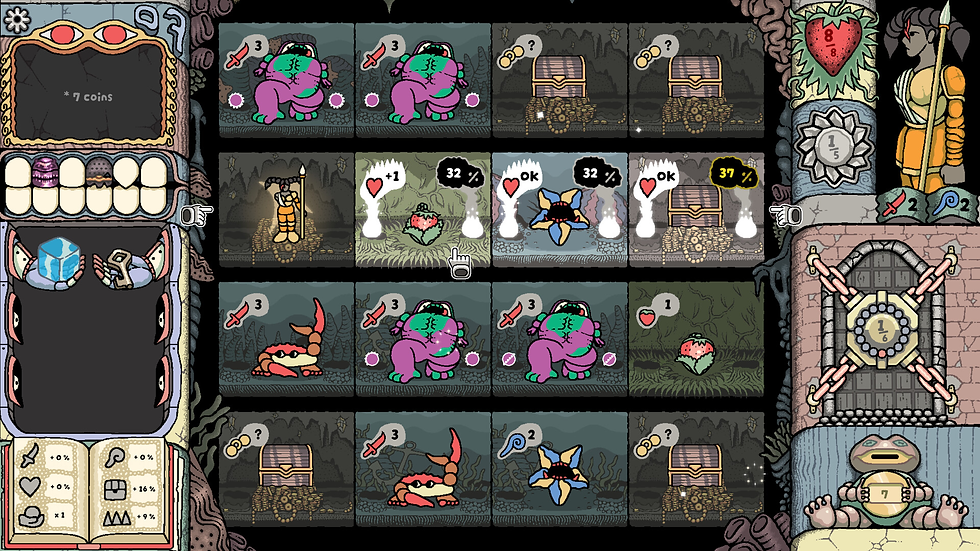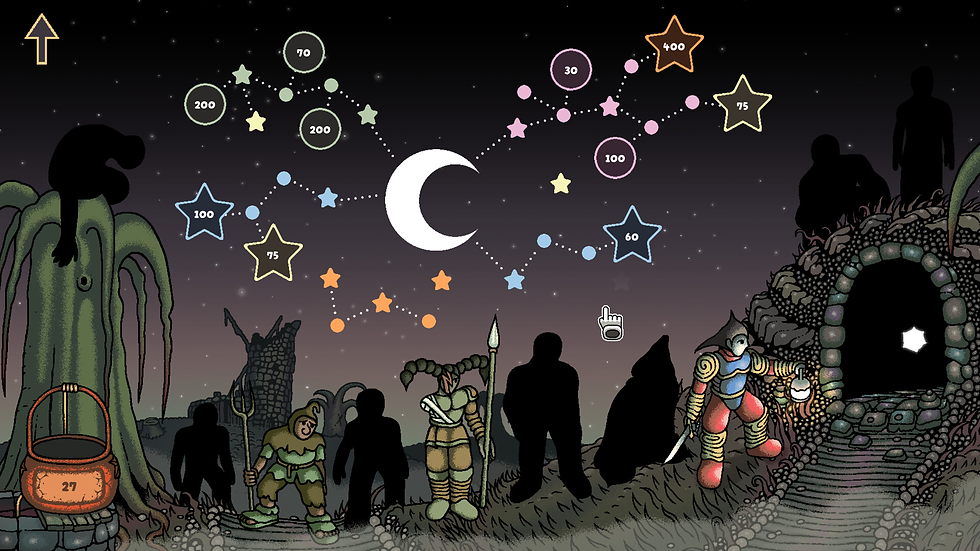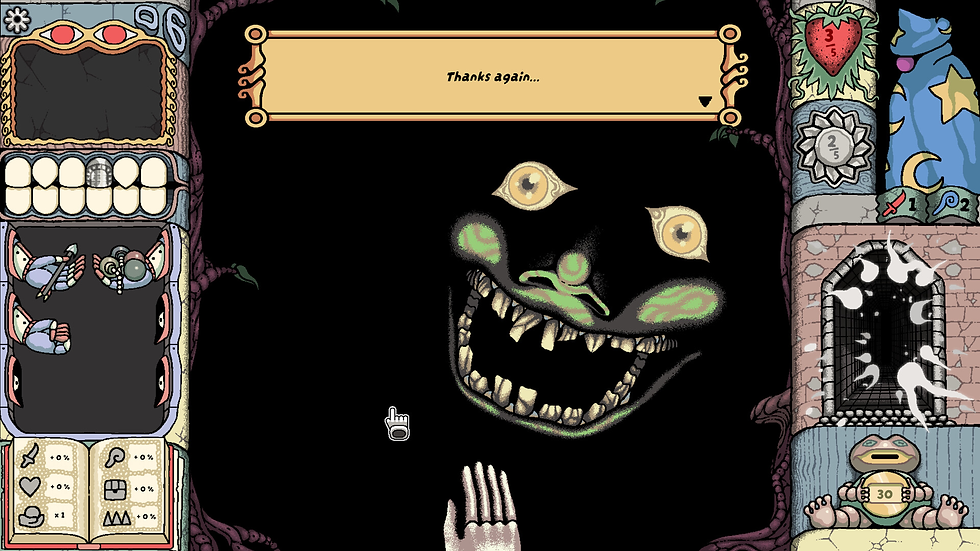SOL CESTO
- Hubert Spala
- Sep 24, 2025
- 5 min read
Roguelikes are a fascinating case study in how genres evolve. Once upon a time, the word “roguelike” conjured a very specific image - ASCII grids, harsh permadeath, procedural dungeons, and a level of difficulty that bordered on masochism. For a while, it was a niche corner of the gaming landscape, fiercely beloved by those who appreciated its punishing rigor. But over the years, the term has changed, broadened, loosened. Today, “roguelike” is less a genre and more of a framework - a skeleton upon which any kind of gameplay can be draped. Deck-builders, farming games, shooters, and even puzzle adventures have been pulled into the fold, all borrowing the same loop of procedural generation, repeated runs, gradual mastery, and progression. With so many variations flooding the market, players are spoiled for choice. Which is why, when a game comes along and tries to do something truly different, strange, or unexpected, it feels refreshing.
And that is exactly what SOL CESTO achieves. This is not just another spin on familiar tropes. Instead, it is a roguelike that decides to take away your sense of direct control while still giving you just enough agency to keep the tension alive. It is a curious gamble of a design, and fittingly, the experience feels like a gambler’s dream game. You are not clashing with tactical combat puzzles or bracing against a steadily rising tide of difficulty in the traditional sense. Instead, you are fighting the odds themselves. The Game asks you to wrestle with probability, to stare into the face of chance, and to make choices that may or may not pan out. You move through a dungeon grid where every placement is a risk, every decision a roll of the dice. The limited items you carry - bombs, arrows, shield baubles - serve as tools to bend chance in your favor, but only up to a point.

On paper, this could sound like a recipe for frustration. Randomized outcomes, limited input, runs that hinge on sheer luck - these are usually the kinds of things that players complain about. But SOL CESTO is smart enough to scaffold this chaos with a clever system of upgrades that shifts the experience from blind chance to weighted odds. Progression revolves around collecting stone and metal teeth - yes, teeth, pulled from strange and gnarly statues - which serve as modifiers for your runs. Each tooth alters the “attraction” between you and various dungeon elements, skewing probabilities in one direction while nudging them away in another.
The beauty of this system is that it forces you to think in terms of trade-offs. Perhaps you pick up a tooth that increases your pull toward treasure chests, giving you more precious coins, but in turn, it decreases your attraction to healing strawberries, leaving you more vulnerable. Another tooth might strengthen your odds of drawing encounters against magic-based enemies, while reducing the likelihood of bumping into strength-based brutes. In effect, you are constantly balancing risk and reward, hedging your bets, and building a run around a particular strategic lean. Other teeth add conditional effects, like weakening monsters if you manage to open several chests in a row, or reducing enemy power when you squash a certain type of foe. The system is fluid, sometimes bordering on unfair, but once it clicks, you realize it is teaching you something essential - you cannot control everything, but you can control how you play the odds.

This is where the roguelike framework really shines. Failure is never just failure. Each run, win or lose, feeds into a broader loop of progression. Between attempts, you can spend your hard-earned coins on permanent unlocks - new items, new events, fresh character options. The roster of characters is particularly fun, as each comes with different stats and its own distinct Sol power, which allows for more controlled traversal over the perilous grid. Move in a column instead of a reel, or just one position from your current one. Those seem tiny, but they have a massive impact in-game, allowing you a narrow escape from a particularly difficult board.
These little powers do not completely erase randomness, but they give you controlled bursts of agency, making you feel clever without breaking the core premise of chance-driven play. The sense of discovery as you unlock these characters and experiment with their quirks adds to the replayability, ensuring the game stays fresh over multiple sessions.
Of course, even with its inventive mechanics, much of the charm of SOL CESTO lies in its presentation. The visuals are unlike almost anything else on the market. Everything is hand-drawn, imbued with a sense of wobbliness and energy that straddles the line between comedic and grotesque. Characters sway and jiggle with exaggerated animations, backgrounds pulse with cartoonish abstraction, and the entire world seems alive with a strange, sketchbook energy. It flirts with childish simplicity, but underneath that playful surface, there is a sinister edge. Shops, doors, interface elements, even the smallest environmental details all bow to this style, creating a cohesive aesthetic that immerses you completely. It is absurd, but also captivating, the kind of art direction that sticks in your memory long after you stop playing.
The audio design is no slouch either. The soundtrack leans into spooky fantasy tones, mixing eerie melodies with bursts of energy that keep you on edge. Sound effects are exaggerated and playful, enhancing the sense of unpredictability and absurdity. Together, the visuals and audio give the game a distinctive personality - part surreal comedy, part eerie carnival ride. It is difficult to put into words, but the style elevates the experience, making every spin of chance feel like part of a larger, chaotic performance.

That said, the randomness at the heart of the game cannot be ignored. For some players, it will be a dealbreaker. No matter how carefully you plan, no matter what upgrades you collect or how cleverly you deploy your items, sometimes the dice do not roll your way. You will be punished by outcomes that feel completely out of your control, and in those moments, the frustration is real. This is the tax the game demands for its originality - it embraces chance so fully that unfairness becomes part of its DNA. And yet, for those willing to accept it, there is a strange liberation in this. You stop trying to master the game in a traditional sense and start mastering your own response to luck, learning when to laugh, when to push, and when to retreat.
In the larger picture, that is what makes this title stand out in the sea of roguelikes. It is not competing with other games on the grounds of tighter combat systems, sharper tactical layers, or more elaborate loot tables. It is offering something unique - a roguelike of chance, built around gambling mechanics disguised as dungeon crawling. By stripping away most direct agency, it forces you to engage with probability itself, something few games have dared to attempt so directly. The brilliance lies in how it makes this feel tense and exciting rather than hollow. When you win, you feel like you beat the odds, and when you lose, you cannot help but think, “just one more try.”
Taken as a whole, SOL CESTO is excellent. Its visuals are superb, its gameplay concept is original, its progression system is rewarding, and its atmosphere is unforgettable. It will not be for everyone, but the same could be said for any truly daring experiment. Those who cannot stand to lose control to randomness may walk away frustrated, but those who can embrace the chaos will find a game that feels like no other. It is a daring departure from the usual formulas, a roguelike that gambles with design itself, and in doing so, delivers something special.





Comments